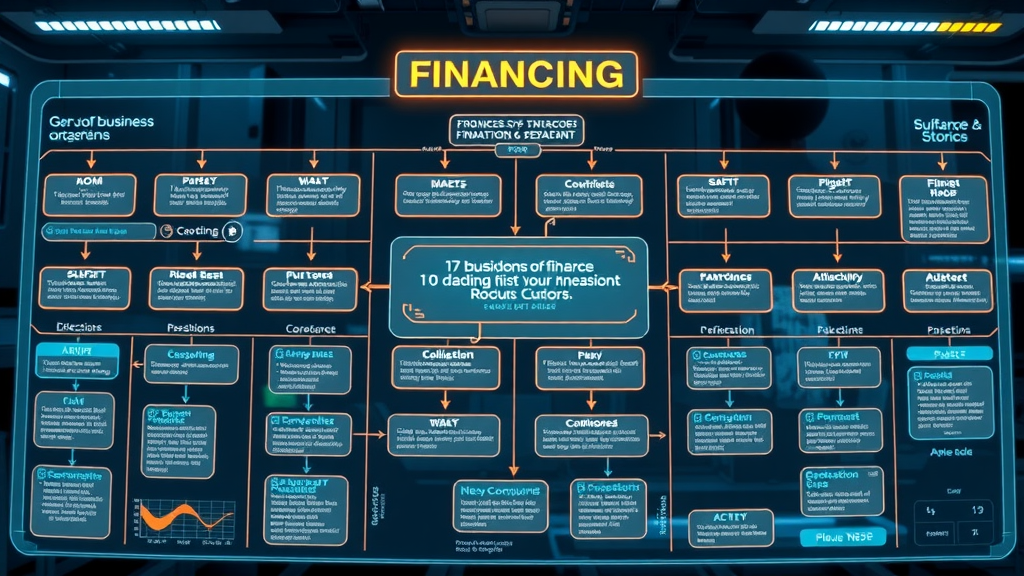Did you know that up to 90% of small businesses rely on alternative financing options to sustain and grow their operations? In an evolving economy, understanding the impact of alternative financing is crucial for entrepreneurs and stakeholders alike. This article explores the nuances of alternative financing, its implications on small businesses, and expert insights into navigating this complex landscape.

Overview of Alternative Financing
Defining Alternative Financing
Alternative financing refers to any funding source that is not a traditional bank loan. This includes methods such as crowdfunding, peer-to-peer lending, invoice financing, and merchant cash advances. These options have gained popularity, especially among small businesses seeking quick and efficient access to funds without the stringent requirements of conventional banking institutions.
According to David Duboff, an expert from RECS of NY LLC, the key to leveraging alternative financing lies in understanding “what's out there.” Many businesses may overlook opportunities because they remain unaware of the various products available to them.
Types of Alternative Financing Options
- **Crowdfunding:** Attract monetary contributions from multiple investors online.
- **Peer-to-Peer Lending:** Borrow directly from individuals through online platforms.
- **Invoice Financing:** Sell unpaid invoices to third parties for immediate cash flow.
- **Merchant Cash Advances:** Receive cash upfront based on future credit card sales but at a higher cost.
- **Equipment Financing:** Loans specifically for purchasing business equipment.
The Shift in Financing Trends
Current Trends in Alternative Financing
The trend towards alternative financing has accelerated significantly in recent years, driven by advancements in technology and changing consumer behavior. As banks apply stricter lending criteria, many businesses have turned to innovative online solutions that often provide quicker access to capital. Platforms now offer tailored financing solutions that can be processed digitally, making it easier for entrepreneurs to secure funding when they need it most.
Impact on Small Businesses
Small businesses have felt the profound effects of this financial shift. In many cases, alternative financing allows companies to avoid lengthy wait periods typical of traditional loan applications. David Duboff highlights, “It’s when you need the funding that banks cut off your line of credit.” Consequently, alternative financing has proven vital for maintaining cash flow, managing operational costs, and seizing immediate growth opportunities.

Pros and Cons of Alternative Financing
Advantages of Alternative Financing
Alternative financing comes with several advantages, notably the speed of funding and flexibility. Businesses can often acquire funds within days rather than weeks, which is critical in fast-paced markets where timing can dictate success. Additionally, many alternative financing options cater to businesses with less-than-perfect credit histories, granting them access to capital they would otherwise be denied.
Moreover, the application processes are usually less rigorous, requiring less documentation compared to conventional loans, which can be a huge relief for busy business owners.

Disadvantages and Risks
While alternative financing offers benefits, it also carries risks. The costs associated with many options, such as merchant cash advances, can be exorbitantly high, leading to a cycle of debt if not managed properly. Additionally, the lack of regulation in some areas can result in predatory lending practices, making it essential for businesses to conduct thorough research before committing to any alternative financing option.

Expert Insights on Alternative Financing
David Duboff's Perspective
David Duboff, of RECS of NY LLC, emphasizes the importance of knowledge when it comes to alternative financing. He suggests that businesses must educate themselves on the various products available in the market. “The key really is knowing what's out there,” Duboff advises. This understanding empowers business owners to make informed decisions that align with their financial needs.
“The key really is knowing what's out there. There are so many different products and a lot of times you might be dealing with a person who's only pitching your one product.” — David Duboff
Best Practices for Business Owners
Business owners should adopt best practices to maximize their success with alternative financing. This includes conducting proper due diligence on lenders and understanding the terms of any agreement. Keeping sound financial records also enables clearer insight into cash flow, helping them decide on the best financing path.

Common Mistakes in Alternative Financing
Identifying Common Pitfalls
One frequent mistake is relying solely on one type of financing without exploring other options that might be more advantageous. Business owners often feel pressure to secure funds quickly, resulting in hasty choices that may not benefit their long-term goals.
How to Avoid Costly Errors
Education and informed decision-making are pivotal in avoiding these mistakes. Engaging with financial advisors or consultants can provide perspective and help business owners navigate the available options effectively.
Actionable Tips for Business Owners
Evaluating Financing Options
When considering financing options, businesses should evaluate all available alternatives and weigh the potential impact on their operations. Focusing on costs, terms, and repayment schedules will ensure they choose the right financing product to support their objectives.

Long-term vs. Short-term Financing Strategies
Understanding the difference between short-term and long-term financing is crucial. Short-term solutions may resolve immediate cash flow issues but could strain finances in the long run if the costs are high. In contrast, long-term financing options often come with lower rates but require commitment and strategic planning.

People Also Ask
What are the risks of alternative financing?
The risks can include high fees, potential for overwhelming debt, and a lack of regulation leading to predatory lending practices.
How does alternative financing work?
Alternative financing typically works by providing businesses with immediate funds through various products such as loans, advances on receivables, or equity crowdfunding.
What are the negative effects of equity financing?
Equity financing can dilute ownership among existing shareholders and may lead to losing control of business decisions.
What are the advantages of different sources of financing?
Different sources of financing provide varied benefits, including speed, accessibility, flexibility, and more favorable terms for certain business circumstances.
Conclusion
Understanding the impact of alternative financing can significantly affect how businesses navigate their financial challenges. By staying informed about available options and their implications, entrepreneurs can make the best choices for their organizations. Whether it's tapping into alternative loans or innovative funding methods, there is potential to enhance a business’s growth trajectory.
Call to Action
Ready to explore your financing options? Call David at (914)-224-6807 for your funding needs!
 Add Row
Add Row  Add
Add 



Write A Comment